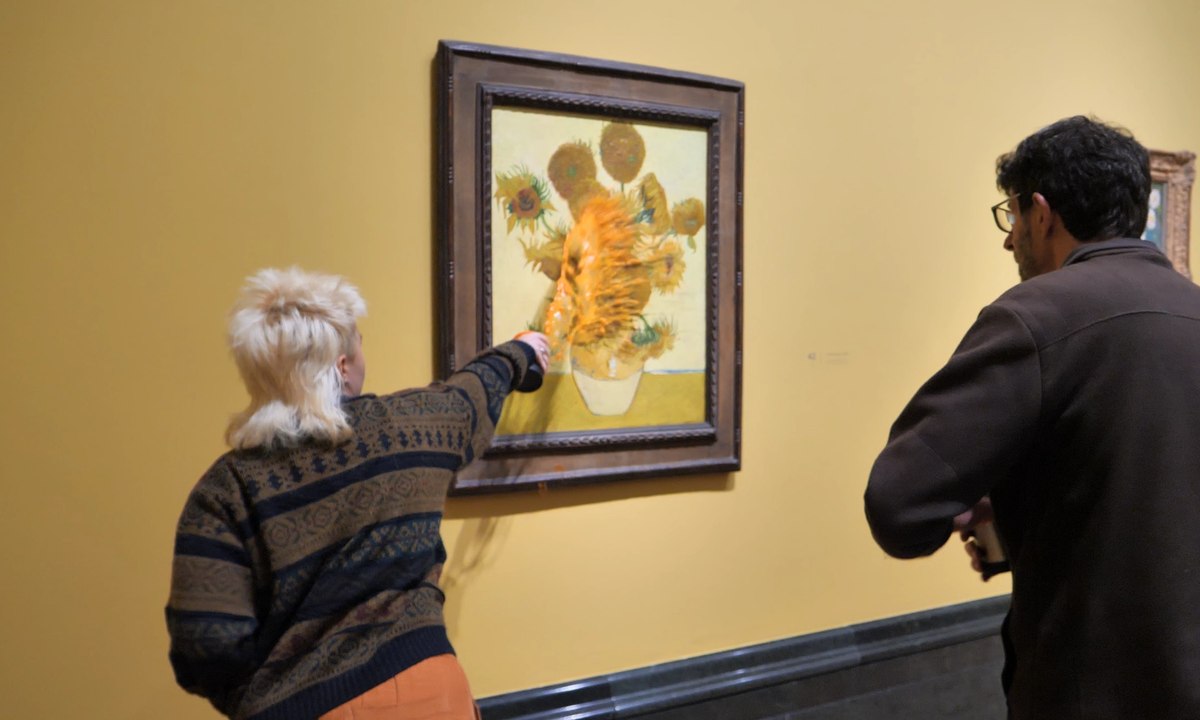In 2024, environmental activists hurled tomato soup at two Sunflowers works by Vincent van Gogh on show at The National Gallery in London
Courtesy of Just Stop Oil. Image by Jamie Lowe
Museum managers will be breathing a sigh of relief at the news that Just Stop Oil are hanging up their high viz jackets and putting away their soup cans, now that their primary campaign demand has been adopted as UK government policy.
The group has made headlines around the world for throwing tomato soup at Van Gough’s Sunflowers, chucking orange cornflour at Stonehenge and supergluing themselves to various works of art, including John Constable’s The Hay Wain at The National Gallery. However, with the UK government’s commitment to ban new oil-drilling licences earlier this month, their key campaign target was met.
Hannah Hunt, one of the members of Just Stop Oil who glued herself to The Hay Wain in 2022, broke the news outside Downing Street on Thursday morning. She said: “Three years after bursting on the scene in a blaze of orange, at the end of April we will be hanging up the hi vis.
“Just Stop Oil’s demand to end new oil and gas is now government policy, making us one of the most successful civil resistance campaigns in recent history. We’ve made fossil-fuel licensing front page news and kept over 4.4 billion barrels of oil in the ground, while courts have ruled new oil and gas unlawful.”
A statement from the group says it will formally end operations on 26 April, with a final action in Parliament Square outside Westminster. The Guardian reports that actions will continue until this date.
Responding to Just Stop Oil's announcement, Heath Lowndes, director of the gallery climate coalition, told The Art Newspaper: “Just Stop Oil’s actions understandably unsettled many in the art world, but they also sparked essential conversations and pushed the climate crisis to the forefront of public discourse. I believe their urgency is proportionate to the scale of the crisis we face.
“While there is a range of opinions in the art world about JSO's tactics, there is widespread support for their ultimate goal: a rapid and fair transition away from fossil fuels. Achieving this demands bold, collective climate action which can take many forms—the cultural sector holds both the responsibility and a unique power to be a leading example of this.”
In some cases Just Stop Oil’s actions have resulted in aggressive anti-protest laws and multi-year prison sentences. These sentences drew criticism from the UN special rapporteur, Michel Forst, who was shocked by the sentences for “entirely non-violent" protest, describing them as “not acceptable in a democracy like the UK”.
In a statement, Just Stop Oil said: “This is not the end of civil resistance. Governments everywhere are retreating from doing what is needed to protect us from the consequences of unchecked fossil fuel burning.
“As we head towards 2°C of global heating by the 2030s, the science is clear: billions of people will have to move or die and the global economy is going to collapse. This is unavoidable. We have been betrayed by a morally bankrupt political class.”
The ancient site remains open as curators investigate the damage
The members of Just Stop Oil are set to appear in court next month
Responding to a recent letter from the National Museum Directors' Council, the campaign groups have proposed a meeting in London's National Gallery—promising to “leave the soup at home”
Revd Sue Parfitt is “quite relaxed” about the prospect of prison for attacking the foundational document as part of climate action but she is upset that her licence to officiate as a priest has been revoked

